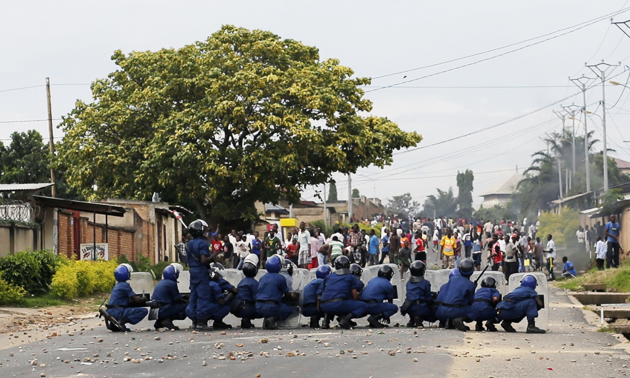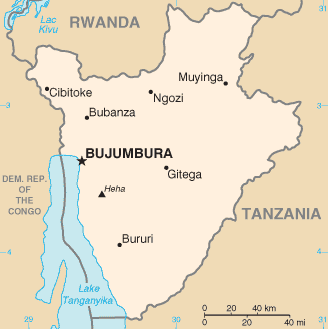“Christians are easily intimidated and fear for their lives”, says a witness. Since the beginning of the political crisis in April, hundreds of thousands have fled to the borders of the country.
 Burundian riot police face demonstrators in Bujumbura. / AP
Burundian riot police face demonstrators in Bujumbura. / AP
“Burundi has still a lot to learn”, sighs Valentine (not her real name), a Burundian student in Belgium whose family has recently moved to Kenya to avoid the troubles in Bujumbura.
She talks about the Arusha Agreements, the troubled past of the country with its ethnic fights and the current situation. The political crisis started around April, when the current President, Pierre Nkurunziza, from the CNDD-FDD party, stated his intention of running for a third mandate.
The opposition objects the third mandate, as it is forbidden by the Constitution. Nkurunziza justifies this decision by stating that for his first mandate he was not elected by the people but by the National Assembly. The CNDD-FDD currently holds an absolute majority that depends mainly on the person of Nkurunziza, who is very popular in rural areas.
Since April, there have been demonstrations organized by the opposition and civil society organizations, rioting, a failed coup in May and refugees running to the borders.
A leader of the opposition was killed at the doorstep of his house in May. “In Burundi, as soon as there is a political problem, it spreads down to the people”, explains Valentine. She has been calling her family regularly since the beginning of the crisis. “This is not an ethnic problem, but a political one. However, due to Burundi’s past, people easily take sides. The army is also divided and this could rapidly degenerate”.
A MUTE CHURCH?
The elections have been postponed to the 15th of July, but the African Union has insisted that Burundi is not ready to run elections. There have been accusations of corruption in the Electoral Commission, the opposition has been boycotting it and the Catholic Church retrieved from the process on the 27th of May while insisting on the desire for “credible elections”. In March the Catholic Church had already opposed the third mandate of Nkurunziza.
The Catholic Church has a strong moral influence in the country, however Valentine explains that “some Christians are not able to take a well-considered position on the matter because the President calls himself a Christian and maintains he has been chosen by God” to run the country.
Peter (also not his real name), a Christian contact in Bujumbura, remarks that “the Church [meaning all Christians] has been disturbingly silent and not a single leader has publicly spoken about the crisis.”
There have been some attempts to bring people together but they have not been effective: “The Church could be screaming for peace, patience and tolerance. We have seen women, effectively, take to the streets in peaceful protest… but nothing from the church.”
Valentine feels that “people who say are Christians lack firmness, are easily intimidated and fear for their lives.”
DAY TO DAY LIFE
“There is no freedom of expression if you are talking against the president”, insists Valentine. Peter says that since the coup all independent radios have been closed and that Twitter is his main source of information these days.
A lot of people do not speak their minds or take sides because they are afraid of their neighbors. “Reporting for work is seen as siding with the president and they risk attack”, says Peter.
 Burundi. / Wikimedia
Burundi. / Wikimedia“Life is uncertain and varied. Shooting and grenades are daily occurances... sometimes close, sometimes not”, continues Peter. Their day to day life consists in listening to the radio, avoiding dangerous areas like the city center, where the police shoots the demonstrators, and stocking food. “Shops are becoming barer as supplies run low due to the lack of imports.”
AN EXODUS OF PEOPLE
Valentine’s parents and family left for Kenya last week to stay with friends. “They are going to stay at least until a month after the elections”, when things become calmer. They are not the only ones, and they are the luckier. Thousands of Burundians are in refugee camps in Uganda and Tanzania, where contagious diseases are the main threat, like a cholera outbreak in Tanzania the last weeks of May.
Peter says it’s been demoralizing to see this exodus, “not only of Burundians but also of NGOs, UN staff and most expat investors”.
We have to realize that the majority of Burundi’s economy comes from aid but governments are now withdrawing funding. “The hidden cost of this is the disruption of businesses. A majority of Burundians have not been paid in May and neither in June”.
He reasons that this, adding to the prices rising could trigger a severe economic crisis that would increase crime.
“What happens when people go hungry and the police does not get paid?”, he wonders.

Las opiniones vertidas por nuestros colaboradores se realizan a nivel personal, pudiendo coincidir o no con la postura de la dirección de Protestante Digital.
Si quieres comentar o